From the Archives — Writing with Writer’s Block
I always used to write. No one could keep me from writing down my ever-changing thoughts, my never-ending stream of consciousness. I was constantly writing, but what am I doing now? I only write long after I am supposed to. I no longer write for fun—honestly, sometimes I feel like I no longer write at all.
I have a friend whose dream is to help change the world’s perspective. Little does he know he has long had this gift to help others experience a more real and subsequently beautiful way of life. He once told me that motivation will not come to you. It is something you must exercise every day so that you might ingrain yourself with a better version of yourself. You are more than your failures—and more than your fleeting successes. You can be so much more. You need to keep pushing yourself and forge motivation rather than waiting for the impossible to happen.
So here I am, with pen to page—or rather fingers to keys—ready to start making good habits. I want to write, that much is true. I want to succeed.
Writer’s block is so much more than getting stuck. It is continual digging. Burying myself along the way. And when things start to settle, I am reminded that the world and all my loved ones are moving on without me. Without me?
So, here’s my start.
When you experience writer’s block, what do you do? Next time you find yourself in this situation, remember that it’s okay if you don’t write today—try again tomorrow. Pace yourself; if you expect to write for a deadline, and only a deadline, you won’t have the opportunity to make your writing your own. If you feel rushed, your creativity can be overlooked.
Take a breath. Free yourself from distractions. Allow yourself to take breaks. Often, we feel pressured to write and think only about producing rather than creating. As someone who describes myself as a passionate writer, I sometimes dread sitting down to write and leave my projects until the last minute. Due to my procrastination, much of my work feels rushed, and I don’t leave time to make my writing into something I am proud of.
Don’t settle. That’s something I had to learn the hard way as all of my assignments met the requirements, but they didn’t sound like my writing—at least not something I would be proud of. Push yourself to go beyond expectations and prove what you are capable of to the world.
Give yourself time to write and make it a part of your routine. It’s okay to start slow as long as you constantly move forward, improve your skills, and learn how to love writing again. As students, we need to make sure we are maintaining our mental health, studies, and relationships; I propose that we prioritize our passions and the reclamation of our writing.
Good luck and keep writing, my friends.
Kira Keir
This post was published on the original UVic ESA website.
From the Archives — 2021 Poetry Contest Winner – Zoë Nilson’s “morning”
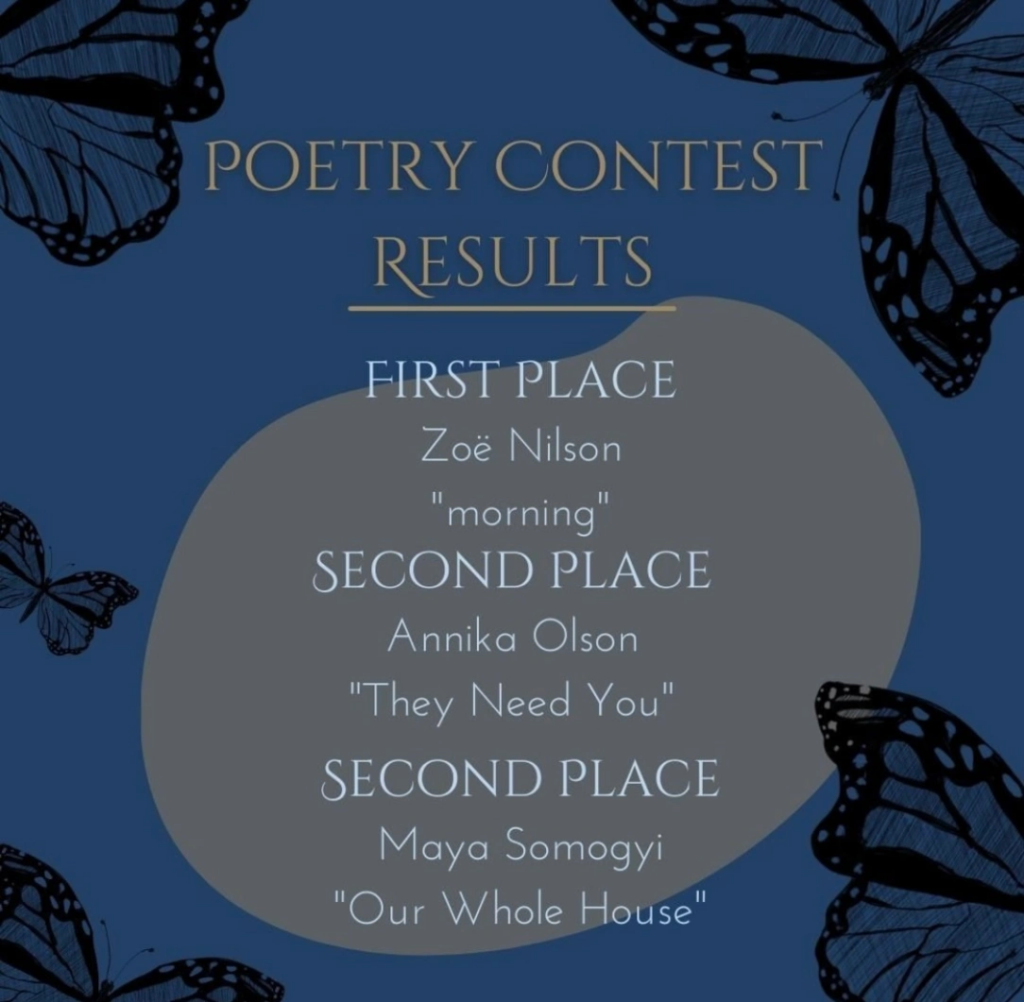
The ESA proudly presents “morning” by Zoë Nilson as the winning poem of the ESA’s Fall 2021 Poetry Contest.
morning
not always, but some days
I wake up feeling new.
nestled in these sheets, I rise
careless, but not clumsy.
no one awake in this tight, tight house
only me, robed in fresh light
daybreak’s armistice
my mind rolls out like fog over hills until
a door slams, lovers howl
a brutal reminder of this suffocating company
cacophonous in its casualties, my heart tightens rudely
waxing and waning for some kind of emptiness
so I slip out the door, before the prickles and horns
sprout from my back, skull-tearing acrimony
for words that only serve to fill the empty space
that hangs there, perfectly vacant.
the house burns behind me
imploding energy, eclecticism, eating themselves
but not me,
molding into destined desolation
not always, but most days.
This post was published on the original UVic ESA website.
From the Archives — 2021 ESA Writing Contest Winner – Maya Linsley’s “Waiting Room”
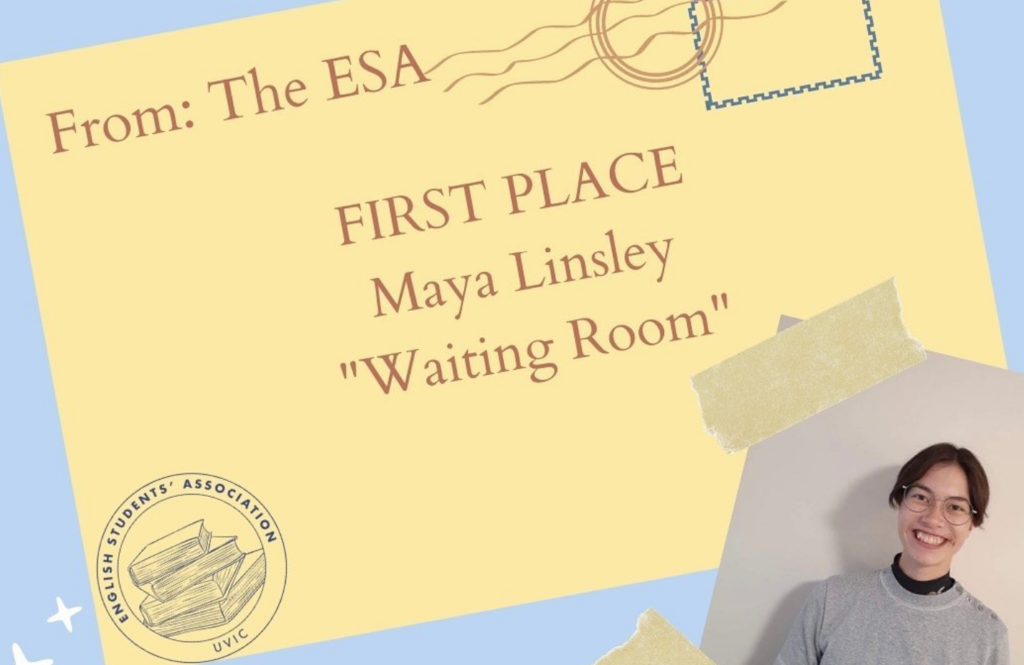
The waiting room crackles. Not in an excited way; just stale. Kind of like everyone there is still recycling the versions of themselves they brought in last time. If you really think about it, you probably know most of them; there’s that old man with the plastic foot brace, and there’s that woman with the baby who won’t stop crying. She hardly looks a year older than you. The desk clerk keeps shooting her surreptitious glances.
The magazine on the small plastic collapsing table is the same, too. You pick it up, feel its greasy skin soak into your pores. There’s a nice article in here about dolphin conservation, if you remember right. The pages fall open across your lap. A suited man with very white teeth offers to sell your house right away.
You flip onwards, and the pages crackle like the people around you. The clock on the wall seems ridiculously loud. Your mother is late again.
Eventually the peeling swing-doors next to the clerk’s desk fly open, and a man strides through them. He scans the room, sees you, and glides over to clasp your hand. His teeth glitter. His palm is freezing.
“Your mother will be just another moment,” he says, his smile leaking cold into the words. “Can I get you some coffee?”
This post was published on the original UVic ESA website.
From the Archives — Reader’s Block

The holidays have always been my favourite time to catch up on all the books I say I am going to read and never even attempt to pick up during the school year. However, in recent years, even that goal has become formidable at times. Studying English tends to turn reading into work, no matter how much we enjoy it, and recently I have found it hard to want to read for fun after having read 16 books in one semester. Last year that led to watching a lot of movies with very few complaints. But this year, school is online and I am additionally developing an aversion to my laptop screen, so back to books it is. I have compiled a little list of strategies to address what I am calling English Major Reader’s Block. If you also suffer from this affliction, I hope this helps.
1. Re-reading!
Sometimes new information can be overwhelming. My brain is tired. I can’t learn anymore, but that does not mean I cannot read. When I am feeling especially tired, I have found it easier to return to old favourites and curl up with something cozy and familiar rather than try to absorb a new set of characters and plots. I recommend taking a day to reread Harry Potter or Little Women or whatever makes you feel warm and fuzzy inside.
2. Change up the Genre
Unless you are taking a specialty course in graphic novels or YA fiction, the books that English majors tend to read can get a little repetitive and tend to stick to realist novels written between 1800 and 1980. I used to think the holidays were a great time to catch up on the holes in my knowledge and cross big titles off of my never ending reading list, but I have had very little luck with that. If you are able to read dense Russian realism after a semester of literature, I salute you, but so far I have had no luck with that ambition. That’s why my second tip is to change genres, try fantasy, sci-fi, graphic novels, mysteries, “trashy” romance novels or anything else that isn’t a part of the traditional literary canon. I used to love fantasy and dystopian novels, but I have neglected this first love for far too long—this winter break I am happy to be once again in its sweet albeit sometimes dramatic embrace.
3. Take it Easy & Don’t Get Ambitious
See my earlier point about dense Russian literature and extend it to Moby Dick and anything written in Middle English. This is not the time to take on ridiculously heavy reading materials or to try and tackle the whole of The Canterbury Tales. It is okay to read only one book over the holidays if that is what you have time for, or to only read a few chapters of one book. Or one poem. Or nothing at all. Big ambitious reading lists are the enemy over winter break and I have found the best thing for my reading has been to abandon them all together. This isn’t always easy, and I have struggled to just read when I want to (if I want to) without worrying about what I am reading or if I am reading enough. There is no shame in an easy read. Currently I am reading The Knife of Never Letting Go by Patrick Ness because I saw the trailer for the adaptation starring Tom Holland. Yes, it is aimed at 13 year olds and one of the three main characters is a dog, and, yes, I am very much enjoying it.
I hope this silly little list helps you pick up a book, any book at all, over the holidays. I enjoy reading, but I also enjoy making lists and since I can’t make a reading list, I have made a how-to-read list instead. In the past few years these strategies really have helped me to abandon my expectations for winter break and actually take advantage of the break from compulsory reading to just enjoy a good book. I hope this helps you and that you have a wonderful New Year, book in hand or not.
Madison George-Berlet
This post was published on the original UVic ESA website.
From the Archives — Congratulations, 2020 Poetry Contest Winners

The ESA would like to congratulate the winners of the 2020 Poetry Contest! First place was awarded to Ojo Taiye for “Moira Camp: The New Colossus”, and second place was awarded to Katherine DeCoste for “Eden”.
Katherine DeCoste has given permission for us to share her poem. Read “Eden” below!
Eden
You think they’re all dead bodies,
but the crabs just molt this time of year,
their soft flesh forcing itself out gaps
where claws were once. Floating down like
corpses on the stinking tide for you to pick
out with curious, uncareful hands and break
between your knuckles. So there it is.
The water clear between the body
and the break.
The stink of it, the shit in it, the smell
of brine you thought fresh for a week
or two, before summer spoiled it and you.
You could, almost, toss his corpse out
into the currents that chill the sea here
so that no matter how far south we get
the water always gnaws at bone.
You used to have faith in something.
Cold clear voice in the night
like a child’s, tin rap of the drum. Here
where the moss grows, the catch and release
of the spider in the arbutus’ nook,
its neck slope, nestled
and you could build a cross from this. From
where the spine curves in its private
pain. From the holes you imagine
in your palms when his eyes go cold.
You could resurrect this.
Or set the whole beach alight.
No birch, no bomb. Only smoke
in the night. But the broken things bend
under the Pacific breeze and you labour
up the reluctant reach of the hill.
His shadow cast over you.
So you smear ash there, between the skin
and the shame. Between the moon
and the cove it hits. Between the garden
and the snake, the body and the break.
This post was published on the original UVic ESA website.
From the Archives — “In Flanders Fields”: How Canada Remembers
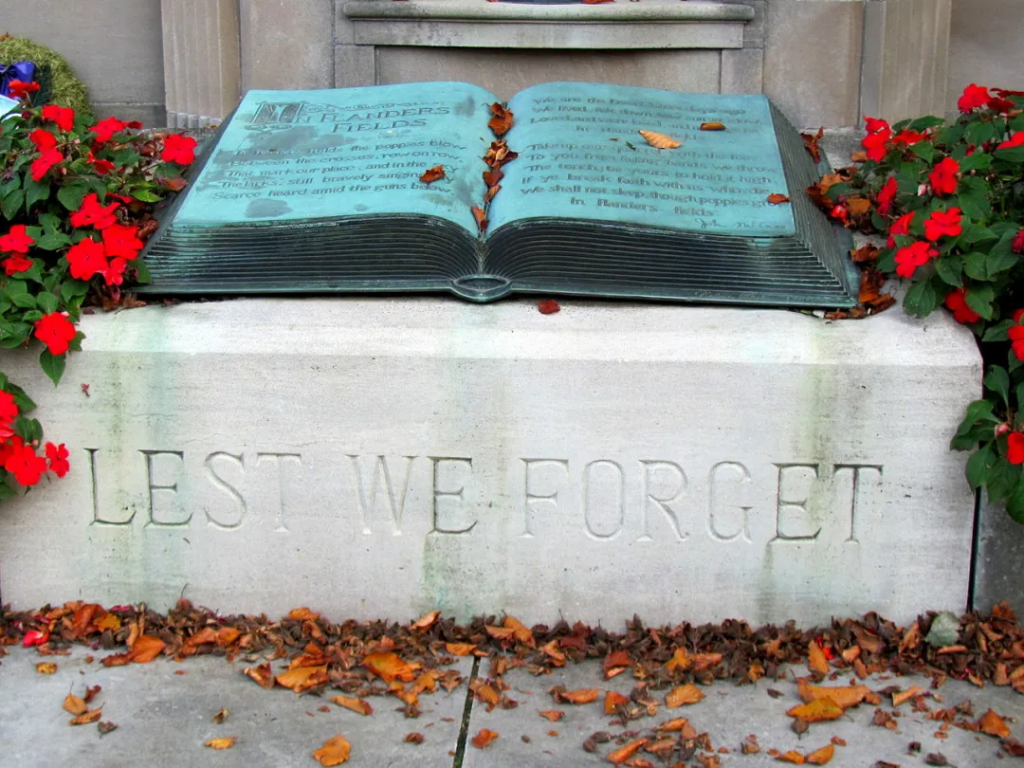
In Flanders fields the poppies blow
Between the crosses, row on row,
That mark our place; and in the sky
The larks, still bravely singing, fly
Scarce heard amid the guns below.
We are the Dead. Short days ago
We lived, felt dawn, saw sunset glow,
Loved and were loved, and now we lie,
In Flanders fields.
Take up our quarrel with the foe:
To you from failing hands we throw
The torch; be yours to hold it high.
If ye break faith with us who die
We shall not sleep, though poppies grow
In Flanders fields.
John McCrae’s “In Flanders Fields” is what I think about every Remembrance Day, so it seems to be the perfect time to reflect on this poem and what it stands for.
Growing up on Vancouver Island meant that this poem was a prominent part of Remembrance Day. As “In Flanders Fields” has become somewhat of a symbol of Canadian remembrance, the poem was read aloud every Remembrance Day ceremony. It was something that all of us students came to expect, and we used it as a tool to honour the fallen soldiers.
Before we discuss the meaning of this famous poem, we should delve into the man who wrote it, John McCrae.
John McCrae was born in Guelph, Ontario in 1872. He was enthusiastic about joining the military, and enlisted when he was just 17 years old, having been involved with the Cadet Corps since he was 14. While being interested in the military, he was also an avid poet, and he attended the University of Toronto on a scholarship.
McCrae went on to become the brigade-surgeon of the First Brigade of the Canadian Field Artillery during World War I. It was here where he penned the now famous poem “In Flanders Fields,” after seeing his friend killed. McCrae noticed the many graves surrounding the area where his men were stationed, and saw the famous red poppies growing upon their makeshift graves. “In Flanders Fields” was the second-to-last poem he would ever write.
“In Flanders Fields” was written to memorialize the millions of deaths from World War I, but it has come to signify the sacrifice of many others in later wars. Our wearing poppies as a symbol of our remembrance and respect for the fallen originated in this poem. Remembrance Day is all about honouring those who fought for our freedom, and John McCrae was one of those people.
For me, this poem is bigger than just a message to remember. “In Flanders Fields” represents a freedom that so many people were not fortunate enough to get. Every year I remember reading these words and thinking to myself, “I can’t even imagine what seeing this must have felt like.” John McCrae gives us a first-hand view of the devastation of war, yet still manages to notice the small beautiful poppies that mark the graves of his fallen fellow soldiers and friends. This imagery alone is enough to make us re-read the poem year after year, and the meaning it holds to so many people continues to show us it’s importance.
All of this being said, Remembrance Day is a time for us to reflect on the privilege we have and take a moment to consider what so many people gave up their lives for. So, if you haven’t done so already, I hope you take a moment to reflect and remember all those who laid down their lives for us.
Biographical information courtesy of poets.org and poetryfoundation.org.
Errin Johnston-Watson
This post was published on the original UVic ESA website.
From the Archives — The Monster Mask: The Humanity behind Gothic Monsters
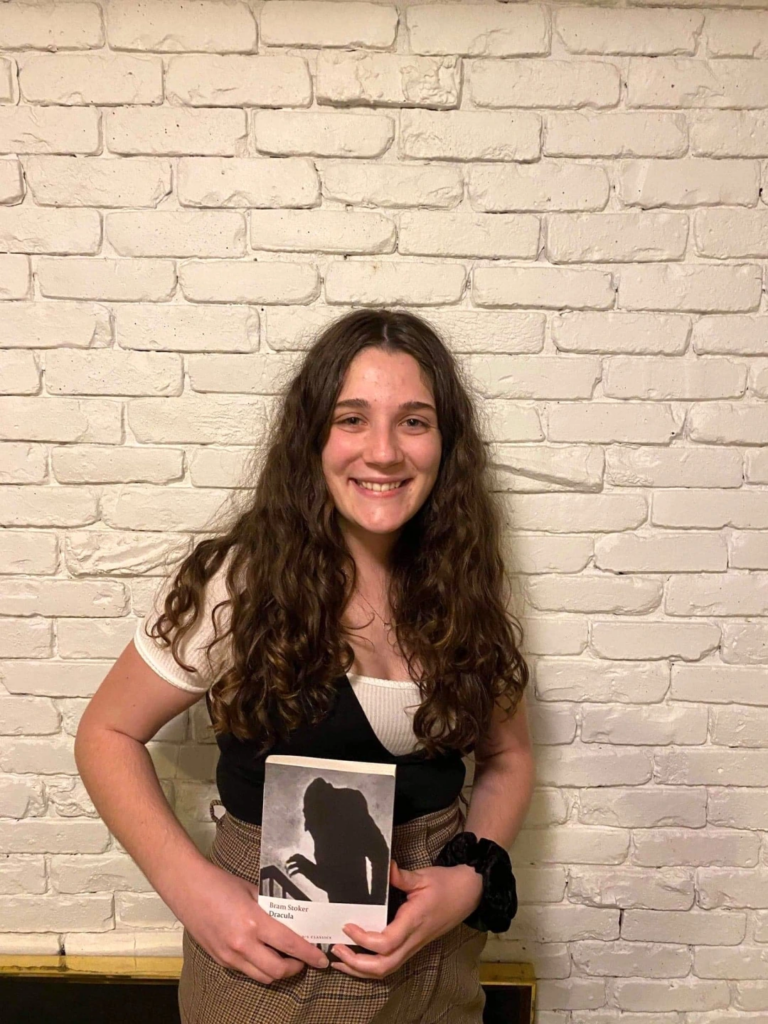
I think it’s safe to say that we’ve all seen a horror movie or two (some more than others), but I’m a big scaredy-cat and don’t want to be too presumptuous. But where do these monsters come from? This thought led me down a rabbit hole that I’m hoping you’ll take a moment to dive down into with me.
Gothic horror, as it came to be known, began in the 18th century, with many people attributing the first horror novel to Horace Walpole’s The Castle of Otranto. Now if you don’t know this book, not to fear, this is probably the only time I’m ever going to talk about it. Gothic fiction, in brief, shows dark sublime scenery and a lot of fog, with romantic and supernatural elements. I could go into it in a lot more detail, but that just wouldn’t be fair to anyone. The main point I want to make is this: gothic is gloomy, and within that gloom are the many famous monsters that we know and love.
When I was growing up, Dracula was a name that I heard every Halloween—he’s the staple vampire in everyone’s mind, aside from maybe Edward. Who hasn’t heard of him, or of Frankenstein’s monster (yes, I said monster, Frankenstein was the doctor)? And these monsters don’t just show up in books and movies, they’re in everything—there’s even a Frankenstein musical if that’s what you’re looking for!
All of this got me to thinking about why these monsters are the famous ones. What makes Gothic monsters something universally scary, to the point where they are heavily featured in the horror genre? Modern novels and films have endless ideas for new monsters, and definitely ones that are far more scary. So why did these ones stick?
In the end, I think it all comes down to the fact that these monsters have something strangely human in them. If you’ve read Frankenstein, I’m sure you remember that giant temper tantrum the monster had on a mountain. These gothic monsters reflect a lot of the insecurities we have about ourselves and our lives. Dracula displays how hard it is to cope with loss and death, and Frankenstein shows how desperately we want to fit in, and, in Frankenstein’s monster’s case, just to be human.
One of the best things we can take away from these gothic monsters is that it’s okay to be human—desirable even! I may be overanalyzing, slightly, but hey, I am an English major. Now, with that all being said, I hope you all get a chance to watch some classic horror movies this spooky season, and try not to read into too many metaphors for the human condition!
Happy Halloween, folks!
Errin Johnston-Watson
This post was published on the original UVic ESA website.
From the Archives — To read, or not to read: Summer reading in a pandemic
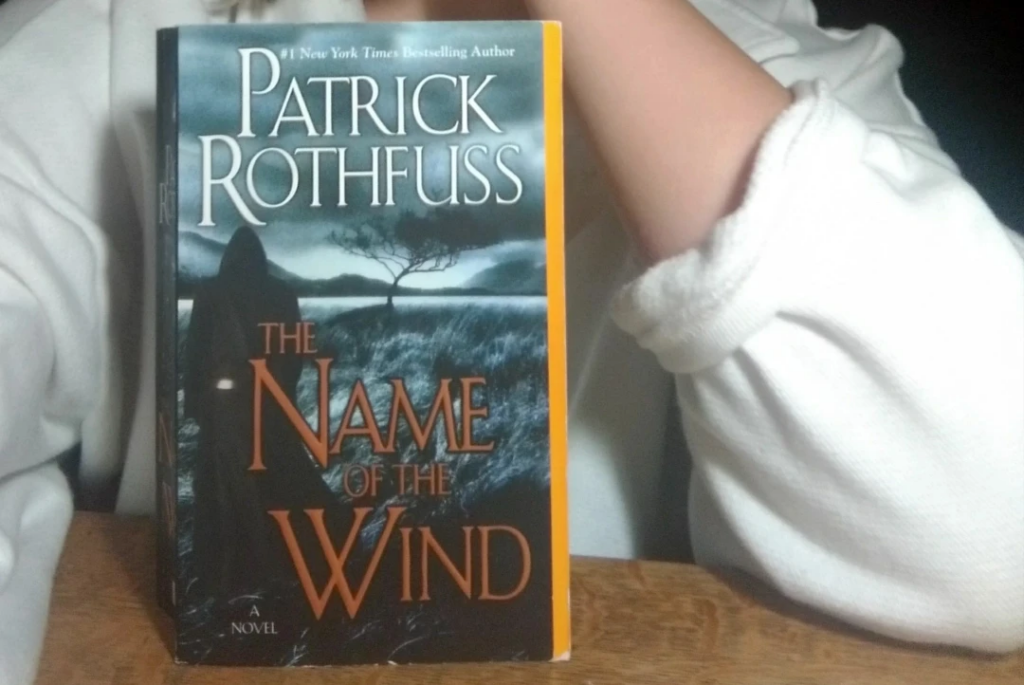
At the beginning of this pandemic, or what some cruelly call a summer, I am sure I was not alone in creating a far-too-ambitious reading list. I had dreams of coming back to class in the fall semester as an entirely remodelled English student; I was imagining something Dead Poets Society-esque, except with more Shakespeare.
These dreams were quickly dashed, as I found myself struggling to even pick up books I’d purchased for pleasure reading and instead chose to leave the books yearning in various corners of my room while I started yet another trashy reality show on Netflix. The only book that was able to cross the boundary from my bedroom floor into my hands was The Name of the Wind by Patrick Rothfuss. The only reason this book made the cut was because I had already started this novel, so it felt like less of a daunting task to re-enter Rothfuss’ fantasy world compared to starting a new one.
I am a person who usually shies away from fantasy novels, steering more towards creative nonfiction, which are all usually depressing and not the sort of thing I felt motivated to read during quarantine. Rothfuss’ books offered a wonderful escape from my reality; it has been a long time since I have found a book as captivating and immersive as this one. His world-building is impeccable. The reader is left guessing and pulling at threads that seem to have no ending, at least not in this one novel. NoTW is the first in the Kingkiller trilogy, but before you pick it up you should know that the third book has not been published. It has been nine years since the sequel was published, so fans of the series are slowly losing hope. If unfinished business in stories excites rather than frustrates you, you will find yourself at home with Rothfuss’ loyal readers. An online fanbase remains active to this day, continuously uploading new theories and discovering new details. Rothfuss does not write a single word that does not carry a deeper meaning, which is why I think this series appealed to me—the close-reading skills I have learned as an English student heightened my enjoyment of this novel and allowed me to dive deeper into the hidden meanings than I would have previously thought were possible or even existed.
This novel opened the floodgates, so to speak, and restored my love for reading. My reading habits also changed over the summer: now, I find myself going for walks or runs while listening to audiobooks of Madeline Miller’s novels The Song of Achilles and Circe or reading collections of stories by David Sedaris. I even purchased and began to read a literary critic’s book on Hamlet.
So, like the unexpected pairing of Hamlet and cartoon lions, this unexpected summer became irrevocably intertwined with unexpected summer reading.
Josiah Lamb
This post was published on the original UVic ESA website.
From the Archives — Welcome to English at UVic 2020
The English Department wants to wish a warm welcome and welcome back to all of our students. COVID-19 has changed our teaching format this this year but our sense of community is still strong. To view the welcome video, click the image below.
This post was published on the original UVic ESA website.